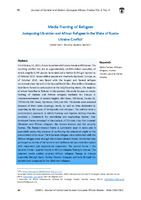Media Framing of Refugees: Juxtaposing Ukrainian and African Refugees in the Wake of Russia-Ukraine Conflict

Megtekintés/
Metaadat
Teljes megjelenítés
Link a dokumentumra való hivatkozáshoz:
Gyűjtemény
Absztrakt
On February 24, 2022, Russia launched a full-scale invasion of Ukraine. The resulting conflict has led to approximately 14,059 civilian casualties of which roughly 5,767 people have died and a further 8,292 got injured as of October 2022. Seven million people are internally displaced. Europe, as of October 2022, was faced with the largest and fastest refugee movement since the end of the Second World War. Five million Ukrainians have been forced to seek asylum in the neighbouring states, the majority of whom have fled to Poland. In this context, this study focuses on media framing of Ukraine and African refugees destined for Europe in international media: Al Jazeera English, ABC News, CBS News, France 24, TRT World, BBC News, Sky News, CNN, and DW. The mediawere selected because of their wide coverage, reach, as well as time dedicated to reporting on the issues of immigrants and refugees. The authors took a constructivist approach in which Framing and Agenda Setting theories provided a framework for identifying and explicating frames. Two dominant frames emerged in the analysis of 23 video clips that covered Ukrainian and African refugees: the human-interest and the security frames. The human-interest frame is commonly used in news and it essentially serves the purpose of portraying the emotional angle to the presentation of an issue. The Ukrainian refugee crisis contrasted with the African refugee crisis through the human-interest frame, the former was portrayed as victims of the barbaric acts by Russia led by a merciless tyrant with imperialist and expansionist objectives. The second frame –the Security Frame –applied mostly to African refugees fleeing to Europe. The selected media outlets covered African refugees fleeing to Europe especially through Spain,Turkey, Greece, Hungary, and Italy through the security lens compared to the Ukrainian refugees.
- Cím és alcím
- Media Framing of Refugees: Juxtaposing Ukrainian and African Refugees in the Wake of Russia-Ukraine Conflict
- Szerző
- Iberi, Daniel
- Saddam, Raudhat
- Megjelenés ideje
- 2023-07-11
- Hozzáférés szintje
- Open access
- ISSN, e-ISSN
- 2786-1902
- Nyelv
- en
- Terjedelem
- 48-63 p.
- Tárgyszó
- media frames, africans, refugee, human-interes, security frame, Ukraine
- Változat
- Kiadói változat
- Egyéb azonosítók
- DOI: 10.59569/jceeas.2022.2.4.115
- A cikket/könyvrészletet tartalmazó dokumentum címe
- Journal of Central and Eastern European African Studies
- A forrás folyóirat éve
- 2023
- A forrás folyóirat évfolyama
- 2. évf.
- A forrás folyóirat száma
- 4. sz.
- Műfaj
- Tudományos cikk
- Tudományterület
- Társadalomtudományok - multidiszciplináris társadalomtudományok
- Egyetem
- Óbudai Egyetem
- Kar
- Bánki Donát Gépész és Biztonságtechnikai Mérnöki Kar
